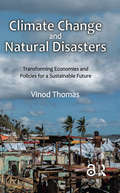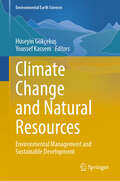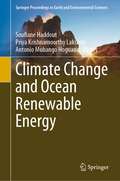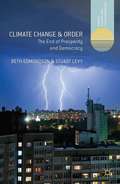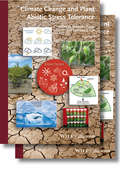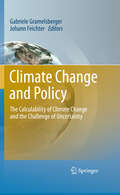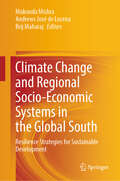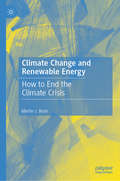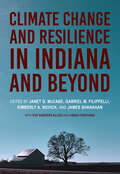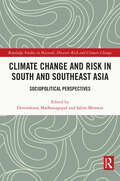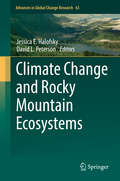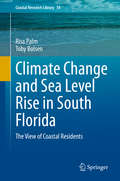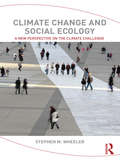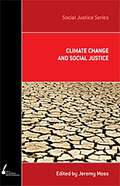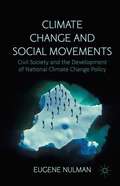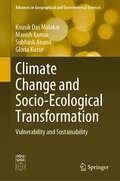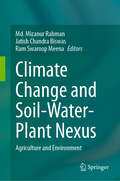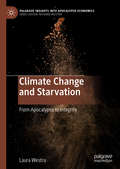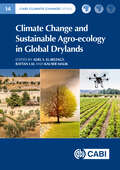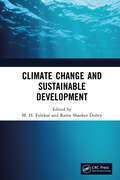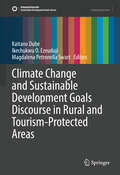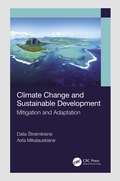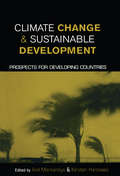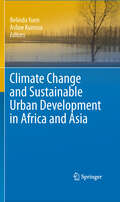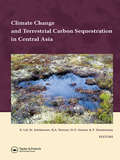- Table View
- List View
Climate Change and Natural Disasters: Transforming Economies and Policies for a Sustainable Future
by Vinod ThomasThe Open Access version of this book, available at https://www.taylorfrancis.com/books/9781351527927, has been made available under a Creative Commons Attribution-Non Commercial-No Derivatives 4.0 license The start of the new millennium will be remembered for deadly climate-related disasters - the great floods in Thailand in 2011, Super Storm Sandy in the United States in 2012, and Typhoon Haiyan in the Philippines in 2013, to name a few. In 2014, 17.5 million people were displaced by climate-related disasters, ten times more than the 1.7 million displaced by geophysical hazards. What is causing the increase in natural disasters and what effect does it have on the economy? Climate Change and Natural Disasters sends three messages: human-made factors exert a growing influence on climate-related disasters; because of the link to anthropogenic factors, there is a pressing need for climate mitigation; and prevention, including climate adaptation, ought not to be viewed as a cost to economic growth but as an investment. Ultimately, attention to climate-related disasters, arguably the most tangible manifestation of global warming, may help mobilize broader climate action. It can also be instrumental in transitioning to a path of low-carbon, green growth, improving disaster resilience, improving natural resource use, and caring for the urban environment. Vinod Thomas proposes that economic growth will become sustainable only if governments, political actors, and local communities combine natural disaster prevention and controlling climate change into national growth strategies. When considering all types of capital, particularly human capital, climate action can drive economic growth, rather than hinder it.
Climate Change and Natural Resources: Environmental Management and Sustainable Development (Environmental Earth Sciences)
by Hüseyin Gökçekuş Youssef KassemThis book provides an overview of promoting the conservation and sustainable use of natural resources and reducing waste and pollution, while also addressing the challenges posed by climate change. Climate change and natural resources are closely linked, as changes in the climate can have significant impacts on the availability and quality of natural resources such as water, air, land, forests, and oceans.Environmental management and sustainable development are crucial to address the challenges posed by climate change and to ensure the long-term viability of natural resources. Also, the planning, implementation, and monitoring of actions that aim to protect and enhance the environment while promoting sustainable development are discussed. In the context of climate change and natural resources, sustainable development involves finding ways to reduce greenhouse gas emissions and adapt to the impacts of climate change, while also promoting resource conservation and sustainable use. As a result, this book is expected to contribute to the existing literature and provide an in-depth study that gives a fresh approach to the academic and multiple stakeholders, including governments, businesses, civil society, and individuals.
Climate Change and Ocean Renewable Energy (Springer Proceedings in Earth and Environmental Sciences)
by Soufiane Haddout Priya Krishnamoorthy Lakshmi Antonio Mubango HoguaneRenewable-energy is energy that is collected from renewable resources that are naturally replenished on a human timescale. Renewable-energy includes sources such as sunlight, tides, waves, wind, rain, and geothermal heat. According to BP's-2018 Energy Outlook (EO), renewable energy will be the fastest growing source of energy, increasing fivefold by 2040 thus providing around 14% of global primary energy at this future point. On the other hand, climate change is bringing about rising temperatures, which have significant negative impacts on humans and the environment, and transitioning to renewable energy sources, such as biofuels, can help meet this challenge. Transitioning to renewable energy, and reducing reliance on fossil fuels, is one way to help slow down the effects of climate change. While renewables used to be a more expensive option, new clean energy technologies are lowering costs and helping to move economies away from fossil fuels. The 1st International Conference on Climate Change and Ocean Renewable Energy (CCORE 2022), is a virtual conference held from November 4-7, 2022, presenting experiences and ideas through research talks and presentations from diverse fields in climate change and ocean renewable energy. This event offers a platform in bringing together a forum for students, postdocs and established scientists to exchange their ideas and contribute to an integrative approach to climate change and ocean renewable energy.
Climate Change and Order
by Beth Edmondson Stuart LevyBeth Edmondson and Stuart Levy examine why it is so difficult for the international community to respond to global climate change. In doing so, they analyse and explain some of the strategies that might ultimately provide the foundations for appropriate responses.
Climate Change and Plant Abiotic Stress Tolerance
by Narendra Tuteja Sarvajeet S. GillIn this ready reference, a global team of experts comprehensively cover molecular and cell biology-based approaches to the impact of increasing global temperatures on crop productivity. The work is divided into four parts. Following an introduction to the general challenges for agriculture around the globe due to climate change, part two discusses how the resulting increase of abiotic stress factors can be dealt with. The third part then outlines the different strategies and approaches to address the challenge of climate change, and the whole is rounded off by a number of specific examples of improvements to crop productivity. With its forward-looking focus on solutions, this book is an indispensable help for the agro-industry, policy makers and academia.
Climate Change and Policy: The Calculability of Climate Change and the Challenge of Uncertainty
by Gabriele Gramelsberger Johann FeichterThe debate on how mankind should respond to climate change is diverse, as the appropriate strategy depends on global as well as local circumstances. As scientists are denied the possibility of conducting experiments with the real climate, only climate models can give insights into man-induced climate change, by experimenting with digital climates under varying conditions and by extrapolating past and future states into the future. But the 'nature' of models is a purely representational one. A model is good if it is believed to represent the relevant processes of a natural system well. However, a model and its results, in particular in the case of climate models which interconnect countless hypotheses, is only to some extent testable, although an advanced infrastructure of evaluation strategies has been developed involving strategies of model intercomparison, ensemble prognoses, uncertainty metrics on the system and component levels. The complexity of climate models goes hand in hand with uncertainties, but uncertainty is in conflict with socio-political expectations. However, certain predictions belong to the realm of desires and ideals rather than to applied science. Today's attempt to define and classify uncertainty in terms of likelihood and confidence reflect this awareness of uncertainty as an integral part of human knowledge, in particular on knowledge about possible future developments. The contributions in this book give a first hand insight into scientific strategies in dealing with uncertainty by using simulation models and into social, political and economical requirements in future projections on climate change. Do these strategies and requirements meet each other or fail? The debate on how mankind should respond to climate change is diverse, as the appropriate strategy depends on global as well as local circumstances. As scientists are denied the possibility of conducting experiments with the real climate, only climate models can give insights into man-induced climate change, by experimenting with digital climates under varying conditions and by extrapolating past and future states into the future. But the 'nature' of models is a purely representational one. A model is good if it is believed to represent the relevant processes of a natural system well. However, a model and its results, in particular in the case of climate models which interconnect countless hypotheses, is only to some extent testable, although an advanced infrastructure of evaluation strategies has been developed involving strategies of model intercomparison, ensemble prognoses, uncertainty metrics on the system and component levels. The complexity of climate models goes hand in hand with uncertainties, but uncertainty is in conflict with socio-political expectations. However, certain predictions belong to the realm of desires and ideals rather than to applied science. Today's attempt to define and classify uncertainty in terms of likelihood and confidence reflect this awareness of uncertainty as an integral part of human knowledge, in particular on knowledge about possible future developments. The contributions in this book give a first hand insight into scientific strategies in dealing with uncertainty by using simulation models and into social, political and economical requirements in future projections on climate change. Do these strategies and requirements meet each other or fail? Gabriele Gramelsberger is Principal Investigator of the Collaborative Research Project is Principal Investigator of the Collaborative Research Project
Climate Change and Regional Socio-Economic Systems in the Global South: Resilience Strategies for Sustainable Development
by Mukunda Mishra Andrews José de Lucena Brij MaharajThis volume showcases how the climate change phenomena (CCP) have been causing multifaceted threats to humankind through increasing numbers of extreme events, affecting social, economic, and human development worldwide. The Global South is especially showcased in this contributory volume where adverse effects of CCP and related disasters impact majority of the population which depends on land and natural resources for their livelihoods. This book asserts that climate change and extreme events are potential threats to sustainable human development and micro spatial observations and analysis of impacts of CCP are vital for adopting resilience policies. This book, not enquiring why CCP is happening, embarks on a quest to showcase how best to respond to such phenomena through detailed and well-founded micro-spatial investigations on poor farmers, pastoralists, fishermen folk, migrant labours, slum dwellers, who are considered the most threatened by climate changes and weather shocks, based on possible disruptions in the production process. Scholarly contributions in this volume analyze how local and regional versions of CCP actively challenge the economies and livelihoods, question the social securities and good governance, and how such phenomena ultimately become a constraint in achieving sustainable development in the Global South. This volume accommodates many aspects of regional adaptation strategies in vulnerable areas and groups in different parts of the Global South to ensure stability and peacefulness. Academicians, research scholars, and readers inquisitive about the socio-economic dimensions of climate change in the Global South, will find the discussions across different chapters of this volume interesting.
Climate Change and Renewable Energy: How to End the Climate Crisis
by Martin J. BushThis book presents a comprehensive overview of the global climate change impacts caused by the continued use of fossil fuels, which results in enormous damage to the global environment, biodiversity, and human health. It argues that the key to a transition to a low carbon future is the rapid and large-scale deployment of renewable energy technologies in power generation, transport and industry, coupled with super energy-efficient building design and construction. However, the author also reveals how major oil companies and petrochemical conglomerates have systematically attempted to manufacture doubt and uncertainty about global warming and climate change, continue to block the commercialization of solar energy and wind power, and impede the electrification of the transport sector. Martin Bush’s solution is a theory-of-change approach to substantially reduce greenhouse-gas emissions by 2050, which sets out realistic steps that people can take now to help make a difference.
Climate Change and Resilience in Indiana and Beyond
by Richard Phillips James Shanahan Geoffrey Brown David M. Konisky Daniel Becker Ellen D. Ketterson Sanya Carley James Robert Farmer Rebecca Lave Keith Clay Paul Staten Eric Sandweiss Elizabeth Grennan Browning Jeffrey S. Dukes Melissa Widhalm Janet G. McCabe Gabriel M. Filippelli Kimberly A. Novick Ben Kravitz Douglas Edmonds Chanh Kieu Travis A. O'Brien Scott Robeson Brian Yanites Chen Zhu Sarah Mincey John Baeten Justin Maxwell Allison Byrd Adam Fudickar Matthew Houser Alex Jahn Jennifer Ann Lau Sarah Wanamaker Heather L. Reynolds Samantha L. Hamlin Dana Habeeb Jeffrey S. Wilson Daniel Myers Beth Edwards Nathan Geiger Andrea Webster Nikolaos Zirogiannis Eva Sanders Allen Lingxi ChenyangClimate change is affecting Indiana's environment, threatening the way Hoosiers live and do business, and introducing new stresses to the state's economy, health, and infrastructure. And while scientists predict more days of extreme weather, increased public health risks, and reduced agricultural production in the coming years, Hoosiers still have a substantial say in determining their future environment. Climate Change and Resilience in Indiana and Beyond confirms that Indiana can rise to meet this threat. The culmination of Indiana University's Prepared for Environmental Change Grand Challenge, this collection showcases how scientists, policymakers, communicators, and others are working hard to protect Indiana's economy and way of life by becoming more resilient. Researchers are creating new environmental resilience frameworks, building on years of existing research on how ecosystems can adapt, how social systems process threats in order to change, and how individuals themselves fit into the larger picture. In addition to presenting research results, Climate Change and Resilience in Indiana and Beyond provides clear examples of how Hoosiers can make a difference by reducing risks, lessening the harmful impacts of climate change, and preparing for the unavoidable.What emerges in these pages is a hopeful, optimistic picture of how resilience is generalizable across systems—from forests to farms to cities—and how Hoosiers are mobilizing this resilience in the face of climate change.
Climate Change and Risk in South and Southeast Asia: Sociopolitical Perspectives (Routledge Studies in Hazards, Disaster Risk and Climate Change)
by Salim Momtaz Devendraraj MadhanagopalThis book, focuses on South and Southeast Asia, upgrades our understanding of the influence of multiple sociopolitical and governance factors on climate change and risks. Moving beyond science and technology-oriented discussions on climate change, it argues that the real solutions to climate change problems lie in societies, governance systems, non-state actors, and the power and politics underpinning these systems. It presents a range of detailed conceptual, empirical, and policy-oriented insights from different nations of South and Southeast Asia, including India, Bangladesh, Sri Lanka, Indonesia, Vietnam, Maldives, and Bhutan. The chapters bring forth critical discussions of climate change, covering a diverse range of topics including livelihoods, gender, community perspectives, relocation, resilience, local politics, climate change communication, governance, and policy responses. By investigating climate change vulnerabilities and as well as offering feasible solutions to the states and other non-state actors in responding to climate change and risks, this book deepens our existing knowledge of the social and political dimensions of climate change. With interdisciplinary perspectives, this book will appeal to all students, researchers, and scholars of environmental studies, geography, disaster studies, sociology, policy studies, development studies, and political science. It provides valuable reading to practitioners, policymakers, and professionals working in related fields.
Climate Change and Rocky Mountain Ecosystems (Advances in Global Change Research #63)
by David L. Peterson Jessica E. HalofskyThis book is the result of a team of approximately 100 scientists and resource managers who worked together for two years to understand the effects of climatic variability and change on water resources, fisheries, forest vegetation, non-forest vegetation, wildlife, recreation, cultural resources and ecosystem services. Adaptation options, both strategic and tactical, were developed for each resource area. This information is now being applied in the northern rocky Mountains to ensure long-term sustainability in resource conditions. The volume chapters provide a technical assessment of the effects of climatic variability and change on natural and cultural resources, based on best available science, including new analyses obtained through modeling and synthesis of existing data. Each chapter also contains a summary of adaptation strategies (general) and tactics (on-the-ground actions) that have been developed by science-management teams.
Climate Change and Sea Level Rise in South Florida: The View of Coastal Residents (Coastal Research Library #34)
by Risa Palm Toby BolsenSouth Florida is frequently cited as the part of the United State of America as most susceptible to the devastation accompanying sea level rise. Several scholarly studies have shown the negative impact of coastal location in Florida on housing values. Are the residents of South Florida concerned? Is susceptibility to sea level rise actually affecting the housing market in terms of demand, the availability of home mortgages, or house prices? Are people living at particular risk from sea level rise aware of this risk and more open to new information about climate change? Do they support policies and laws to mitigate the pace and extent of climate change? Answers to these questions are not only of general interest, but they are also key to our understanding of the human dimensions of this problem. This book describes the results of a detailed survey in which respondents viewed a local map displaying flooding to their own community that would result from a Category 3 hurricane in 2033. It discusses political party identification and ideology that has an overwhelming impact in shaping views about sea level rise and climate change. This book has enormous implications for the effectiveness of communicating risk information. The text is important if we, as a nation, are to design communication strategies that will lead to broader policy to combat or mitigate this risk.
Climate Change and Social Ecology: A New Perspective on the Climate Challenge
by Stephen M. WheelerAlthough strategies to prevent global warming – such as by conserving energy, relying on solar and wind power, and reducing motor vehicle use – are well-known, societies have proved unable to implement these measures with the necessary speed. They have also been unwilling to confront underlying issues such as overconsumption, overpopulation, inequity, and dysfunctional political systems. Political and social obstacles have prevented the adoption of improved technologies, which would provide only a partial solution in any case if the fundamental causes of greenhouse gas emissions aren’t addressed. Climate Change and Social Ecology takes a new approach to the climate crisis, portraying global warming as a challenge of rapid social evolution. This book argues that, in order to address this impending catastrophe and bring about more sustainable development, we must focus on improving social ecology – our values, mind-sets, and social organization. Steps to do this include institutional reforms to improve democracy, educational strategies to encourage public understanding of complex issues, and measures to prevent corporations and the wealthy from shaping societies in other directions instead. This book presents a captivating vision of how to help social systems evolve toward sustainability and explores the social transformations needed for dealing with the climate crisis in the long term. It reviews the climate change strategies considered to date, presents a detailed description of a future sustainable society, and analyzes how this vision might be realized through more conscious public nurturing of our social systems. This interdisciplinary volume provides a compelling rethink of the climate crisis. Authoritative and accessible, it will be of great interest to anyone concerned about climate change and sustainability challenges and is essential reading for students, professionals, and general readers alike.
Climate Change and Social Justice
by Jeremy MossThe impacts of climate change can already be felt in society and on the Earth itself. As new evidence of the environmental impact of climate change is constantly emerging, we are forced to confront the significance of our political decisions about who will pay the price of responding to a changing climate. In the rush to avoid or reduce the repercussions of climate change, we need to ensure that the burden is evenly distributed or run the risk of creating injustice. Climate Change and Social Justice demonstrates that the problem of how to distribute the costs of climate change is fundamentally a problem of justice. If we ignore the concerns addressed this book, the additional burdens of climate change will fall on the poor and vulnerable. Jeremy Moss brings together today's key thinkers in climate research, including Peter Singer, Ross Garnaut and David Karoly, to respond to these important issues.
Climate Change and Social Movements: Civil Society and the Development of National Climate Change Policy
by Eugene NulmanClimate Change and Social Movements is a riveting and thorough exploration of three important campaigns to influence climate change policy in the United Kingdom. The author delves deep into the campaigns and illuminates the way policymakers think about and respond to social movements.
Climate Change and Socio-Ecological Transformation: Vulnerability and Sustainability (Advances in Geographical and Environmental Sciences)
by Manish Kumar Subhash Anand Kousik Das Malakar Gloria KuzurThis book focuses on various psycho-social and socio-physical aspects of climate change and includes a wide range of case studies. Included topics are notable climate-related social thinking; climate vulnerability; transformation in socio-ecological subsystems; bioclimatological, urban bioclimatological and socio-bioclimatic ideas; disasters; policy instruments; climate justice; human rights; and sustainability. The book distinguishes itself from similar works by including a wide variety of topics and assists policy management in the current and upcoming climate crisis era. This book also addresses the Sustainable Development Goals 13 (Take Urgent Action to Combat Climate Change and Its Impacts), highlighting resilience, recovery potential and adaptive capacity, climate change measures integrated into policies and planning, and knowledge and capacity to mitigate climate change. The ideas covered in this book evolved in response to the current climate crisis, ideas that the authors believe will aid in societal management and development in the present and future. The book is a useful source for planners, geographers, professionals, academics, government officials, laypeople, and others interested in climate change.
Climate Change and Soil-Water-Plant Nexus: Agriculture and Environment
by Ram Swaroop Meena Md. Mizanur Rahman Jatish Chandra BiswasThe edited book provides a comprehensive and up-to-date overview of scientific developments in agricultural sustainability under changing climate conditions. It focuses on the linkages among soil, water, and crops and their management options to maintain soil health and ensure a sustainable crop production environment. The book addresses the scenarios and challenges of agricultural sustainability in the face of climatic change. With increasing pressure on our limited land and water resources to produce higher crop yields for a growing global population, the efficient use of soil, water, and fertilizers is crucial for achieving most of the United Nations' Sustainable Development Goals (SDGs). The book presents climate change mitigation and adaptation options to help achieve these SDGs. It highlights the impact of climate variability on agricultural production and the functions of ecosystems, emphasizing the importance of developing climate-resilient agriculture to sustain food production and reduce greenhouse gas emissions. The book explores the soil-water-plant nexus and its response to changing climate, characterizing seasonal and inter-annual climatic variability in crop growth and yield. Different chapters evaluate the effects of climate change on soil health degradation, depletion of soil nutrients and carbon contents, and crop responses to climate variability. This book is of interest to academicians, researchers, scientists, capacity builders, and policymakers. Extension personnel will benefit from its insights, and it serves as valuable supporting material for graduate students of agriculture, forestry, ecology, soil science, and environmental sciences in understanding and designing their own research.
Climate Change and Starvation: From Apocalypse to Integrity (Palgrave Insights into Apocalypse Economics)
by Laura WestraThere is a lot written on climate change from various points of view, but this is the first work that demonstrates the connection between the hunger of the poor, the deprivation of safe and healthy food on the part of those who can afford it in the wealthy countries, but still face starvation in the sense of lack of nourishment, and climate change itself. It looks at the case law and the jurisdiction of the ICC, and adopts a thorough critical approach. This book is an excellent contribution to the development of the debate on climate change.
Climate Change and Sustainable Agro-ecology in Global Drylands (CABI Climate Change Series #22)
by Rattan Lal Adel S. El-Beltagy Kauser MalikDrylands, a home for nearly 2.5 billion people, are highly vulnerable to anthropogenic climate change, and dryland area may expand to 50% of the Earth's surface by 2100. Climate change may aggravate the prevalence of undernutrition and malnutrition because of adverse effects on quantity and quality of food production in these regions. This book takes a holistic approach to sustainable management of drylands to make agriculture drought-resilient. Eminent scientists from around the world share their knowledge and experiences for adaptation and mitigation of the anthropogenic climate change through innovation in sustainable management of water, soil, crops, livestock, and fisheries. They anticipate that climate change will have major impacts on agro- ecosystems which requires continuous dynamic assessments, globally, regionally, and at the local level where the major action of adaptation would have to occur. The assessment will require international cooperation and national capacity-building. This book emphasizes approaches such as smart and precision agriculture, conservation agriculture, and new innovation and technology as tools for adaptation and mitigation. Several chapters are devoted to the human dimensions and policy considerations with emphasis on enhancing coping and adaptive capacity. This book addresses the picture after COP27, including loss and damage, governance and finance. This book: Examines sustainable management for drylands as a solution to environmental and food security issues. Uses a holistic approach to evaluate sustainable management of drylands. Explains how researchers are translating science into action for greening global drylands. This work will be valuable to students and researchers in agroecology, climate change science and dryland agriculture.
Climate Change and Sustainable Development
by M. H. Fulekar Rama Shanker DubeyClimate Change and Sustainable Development covers the climatic and atmospheric changes, greenhouse gases and their impact on eco-system, biodiversity, water resources, agriculture and food security, human health, extreme weather and environment across two sections. The mitigation and adaptation strategies involving sustainable development is also illustrated including efficient technology, renewable energy, developmental activities control and so forth. Nanotechnology for sustainable development, forest protection, environment, social and economic sustainability and climate change policy planning of international bodies like UNFCC, UNDP, Kyoto protocol is also included. Features: Covers climate change fundamentals and its impact on different ecosystems and natural disasters Describes non-renewable energy aspects like fossil fuel, coal, oil, natural gas and so forth Explores sustainable development in terms of environment, social and economic aspects Includes species diversity and loss, agriculture productivity, water resources scarcity, health and environmental, rise in sea level and coastal area submergence Illustrates scientific hybridization of traditional ecological knowledge for enhancing climate change adaptation This book is aimed at graduate students and researchers in engineering and public policy, engineering management, sustainable engineering, renewable energy engineering, environmental engineering, and sustainability.
Climate Change and Sustainable Development Goals Discourse in Rural and Tourism-Protected Areas (Sustainable Development Goals Series)
by Kaitano Dube Magdalena Petronella Swart Ikechukwu O. EzeudujiDespite its potential to unlock socio-economic benefits in rural and protected areas in a manner that addresses the Sustainable Development Goals (SDG), rural and protected areas tourism is yet to be thoroughly examined by academics, scholars, practitioners, and policymakers. This lack of exploration has undermined the potential benefits associated with tourism development in rural and protected areas. Given the complexity of rural tourism, this contributed volume explores current and future debates on the subject using cases in Southern Africa. The book is useful for various audiences, including tourism academics, planners, cultural and heritage practitioners, and rural development planners. The topics covered include gender, transformation, service delivery, visitor experience, wildlife tourism, and host-community tourism interaction.
Climate Change and Sustainable Development: Mitigation and Adaptation
by Asta Mikalauskiene Dalia ŠtreimikienėClimate Change and Sustainable Development: Mitigation and Adaptation focuses on the link between climate change threats and sustainable development goals. This book analyzes the polices of climate change mitigation and adaptation from an economic point of view by addressing globalization, international trade, and business opportunities and challenges. Based on extended research on energy, transportation, agriculture, and more, the case studies included in this book present business opportunities linked to mitigation and adaptation actions; from European Union greenhouse gas emission trading to climate change adaptation policies in developing countries. It presents a framework for the harmonization of climate and sustainable development policies and their mutual outcomes. Specific features: The first book to address main scientific aspects of climate change mitigation and sustainable development and how to deal with these main challenges in a harmonized way Provides practical examples of policies and business development opportunities linked with climate change mitigation and adaptation Analyses climate change challenges and provides implications for business development and good practice case studies from Europe Discusses issues of climate change at different scales ranging from macro to micro level Highlights the importance of climate change adaptation for developing countries, migration trends, city developments and agriculture As the threat of climate change grows ever more present, resources like this book, that provide and discuss necessary solutions and frameworks for ways to deal with and mitigate that threat become ever more essential. This book is a vital resource for academics, students, and professionals in any field seeking to deal with the threats from climate change, and particularly those relating to environmental and climate sciences, as well as those in political and economic fields.
Climate Change and Sustainable Development: Prospects for Developing Countries
by Anil Markandya Kirsten Halsnaes'Makes a substantial contribution to the practical, effective analysis of climate change mitigation options in developing countries.'Development And Cooperation'The book is an excellent exercise and a good source of detailed information, and a basis for further discussions. Any person interested in this major environmental problem should read it.'International Journal of Environment and Pollution'Markandya and Halsnaes' collection is thoughtfully put together and can be recommended to all the practitioners in the fields of climate change and sustainable development.'The Journal of Energy LiteratureThis text argues that the policies pursued by developing countries will be crucial in determining the progress of climate change. Many are industrializing rapidly and the largest, particularly China and India, could have an impact at least as significant as that of the already industrialized economies - the reason given by President Bush for taking the US out of the Kyoto Protocol. The future of sustainable development in large measure depends on developing countries. This book develops a pragmatic framework for evaluating the climate change options faced by each developing country, depending on their individual circumstances. It assesses present methods, suggests how these might be improved, and proposes ways in which social and developmental aspects can be taken into account. Its discussion of the issues and the methods presented contribute to the practical analysis of climate change mitigation options in developing countries. The book should be useful to professionals, governments, international organizations and environmental groups working on climate change issues; as well as researchers, academics and students in economics, environmental and development studies and international affairs.
Climate Change and Sustainable Urban Development in Africa and Asia
by Belinda Yuen Asfaw KumssaThis book is about African and Asian cities. Illustrated through selected case cities, the book brings together a rich collection of papers by leading scholars and practitioners in Africa and Asia to offer empirical analysis and up-to-date discussions and assessments of the urban challenges and solutions for their cities. A number of key topics concerning housing, sustainable urban development and climate change in Africa and Asia are explored along with how policy interventions and partnerships deliver specific forms of urban development. It is intended for all who are interested in the state of the cities and urban development in Africa and Asia. Africa and Asia present, in many ways, useful lessons in dealing with the burgeoning urban population, and the problems surrounding this influx of people and climate change in the developing word.
Climate Change and Terrestrial Carbon Sequestration in Central Asia
by B. A. Stewart R. Lal M. Suleimenov D. O. Hansen P. DoraiswamyThis book brings together current knowledge of terrestrial C sequestration in Central Asia. The themes treated include: biophysical environments, water resources, sustainable agriculture, soil degradation, the effects of irrigation schemes on secondary salinization, soil management and its relationship to carbon dynamics; the relationship between f
